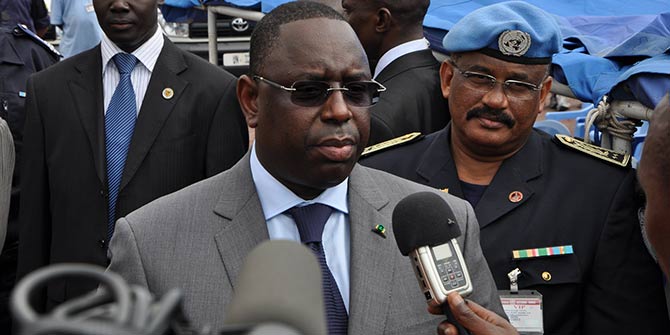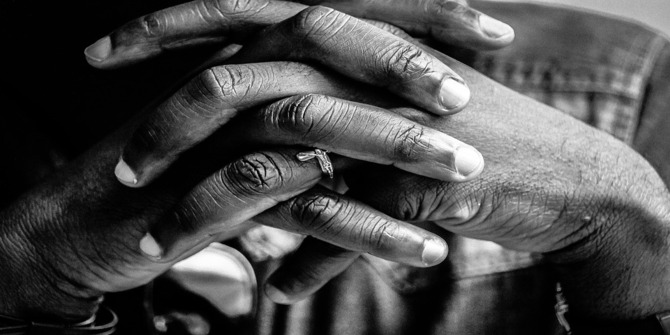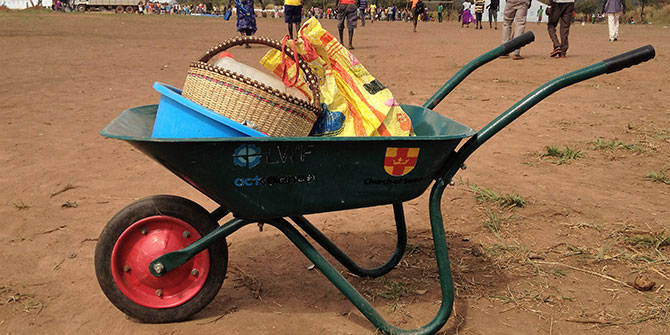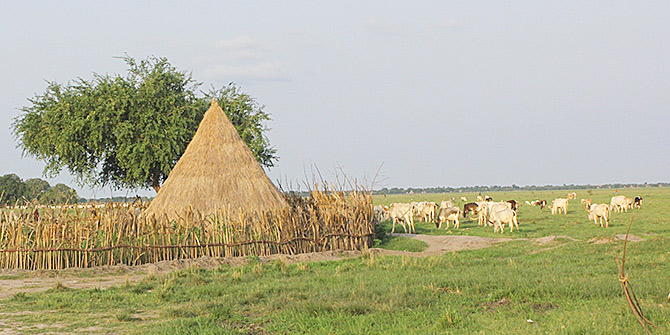LSE’s Yossie Olaleye, Hope Kyarisiima, and Camilla Omollo reflect on the debates that took place at the Decolonising Education conference that took place at the University of Sussex on Monday 11th April.
The concept of decolonisation—or decoloniality—has existed for decades, particularly in use among postcolonial scholars and activists from the Global South. Fanon’s decolonisation theory, for example, posed philosophical questions about the colonial roots of global politics, education, law, and travel, all of which, in many ways, have a violent history at their core. It is against this violence, both material and symbolic, that movements of decoloniality fight. In recent times, the concept of decolonisation has mostly garnered global attention from the academic and institutional angle. Through social media and other digital technologies, we witnessed movements from #FeesMustFall to #RhodesMustFall (and #RhodesMustFallOxford), and we listened to Professor Sabelo Ndlovu-Gatsheni’s excellent lecture at LSE on South African universities as sites of struggle.

Photo Credit: Desmond Bowles via Flickr (http://bit.ly/27dUE6W) CC BY-SA 2.0
As LSE students who had become accustomed to a particular conference setting, we were a little taken aback by the setting of the #DecolonisingSussex conference. We had walked in expecting to see beautifully arranged tables with long, skinny mics and a lovely banner promoting the university. Instead, we walked into a room with chairs arranged in an open circle, no desks, and, even more alarming, no conference folder or leaflet. For us, then, being within that space demanded reflexivity, which, in some ways, is at the core of the struggle to decolonise education and academic institutions.
As students of the social sciences, the concept of reflexivity is not unfamiliar. We often speak of reflexivity in research as critical self-evaluation whereby one assesses the experiences and assumptions they bring into research in order to reduce bias. As LSE’s Clare Coultas argued recently, this is easier said than done, and it was at the #DecolonisingSussex conference that we realised this. It forced us to step back and acknowledge our privileges and biases, even though we were of African ancestry and thus met some requirements for the label of ‘minority’ in the UK.
At the start of the conference, we introduced ourselves and shared our reasons for attending the conference. For some of the attendees, the key question concerned the meaning of decoloniality – what does it mean to decolonise knowledge, education, institutions? Can there be a discourse on decoloniality without the colonial history? Other attendees were less well versed on the polemics of decoloniality and sought to use the conference as an initial point of exposure to the debate on decolonisation of education. There was a dynamic selection of speakers, ranging from activists and creative artists, to professors and doctoral students. The breadth of knowledge among audience members was also inspiring, and the variety of views fostered interesting conversations.
A focal point of discussion was that of universities as sites of privilege and power. There are tensions between decoloniality and neo-liberal education, with the latter of being argued to chip away at the autonomy of critique to satisfy economic goals. This, too, was an instance in which reflexivity was demanded of us as participants. In order to engage fully in the discussion, we had to consider how much we had come to see education and the university in relation to the market (entry into capitalist employment), rather than in relation to freedom, as argued by Keguro Macharia. Thus, the implicit thrust of the conference was centred around how to revisit the more radical past of the University of Sussex while creating a future of pluriversality within education by ‘unenclosing’ knowledge.
What followed in discussions about challenging the ‘hegemony of white, European knowledge’ (Budd Hall) was the realisation that the decoloniality debate is not homogenous. The fight for pluriversality stems not from a uniform approach on decolonising education, but from the congruence of various ideas, motivations and aims. One speaker at the event, for example, criticised recent decoloniality initiatives carried out at elite universities for being ‘top-down’ and thus overlooking the value of students’ voices.
The process of ‘unlearning’ current hegemonies of knowledge will be multifarious. Decoloniality will not be made manifest out of thin air; rather, it will be a contested process of debate, negotiation, and protest. As such, what stood out during the conference was the necessity of familiarising oneself with the discomfort that accompanies the process of decoloniality. This prompt is particularly applicable to universities such as LSE, where the debate on decolonisation has only just begun to gain traction, perhaps because the process of decolonising long-standing institutions is one that elicits discomfort among those who push for it and those on the receiving end.
Overall, it was an enriching experience that was also emotionally and intellectually challenging. We look forward to a time when an institution like LSE will meaningfully engage with the subject matter through a host of avenues, given its significant role in shaping social science discourse and enhancing the process of knowledge production and dissemination in our highly connected world. The Research Conference for the 2016 LSE Africa Summit was a step in the right direction. This is because it provided fresh insight into Africa-specific issues from a collection of academics, entrepreneurs, and scholars who brought diverse knowledge and experiences reflective of Africa’s heterogeneity.
For a comprehensive reading list on the decolonisation of education and the academy, follow this link: The African Politics Reading List.
You can also read reflections of the #Decolonizing the Academy Conference held at the University of Edinburgh in April 2016.
Yossie Olaleye is an MSc student in Media and Communications (Communication Governance). Follow her on Twitter @yossiepaul. Hope Kyarisiima is an MSc student in Development Management. Camilla Omollo is an MSc student in Development Studies. Follow her on Twitter @Camilla Omollo.
All three students are part of LSE’s Programme for African Leadership which facilitated attendance and participation in this conference.
The views expressed in this post are those of the author and in no way reflect those of the Africa at LSE blog or the London School of Economics and Political Science.






First of all thank you Olalaye and Omollo for representing us in Sussex. It is going to take awhile to undo the brainwashing that has occurred in Africa. From head of states to jobless youth in the continent, western civilization has inflicted a serious damage on the psyche and ambitions of Africans all over the world. It took time for a mass acknowledgement of this fact, it is going to take much longer to start a tangible action to undo the damage. ”Rhodes must fall” has been well utilized to magnify the African psychological prison, a bolder and more demanding plan to act on the African condition must then follow. However, it is funny that the same powers we are so yearning to break free from are the same pillars we are relying on to make our voice heard. This world is a big game reserve, you either kill or be killed, unfortunately, Africa is a prey that is whining in the lap of her predator.
George Padmore decried the use of “decolonization” in the 1950s (thus suggesting the concept was in play not decades but over a half-century ago. Since he understood it as a piece of Russian communist dogma he argued for the use of the alternative “transfer of power.”